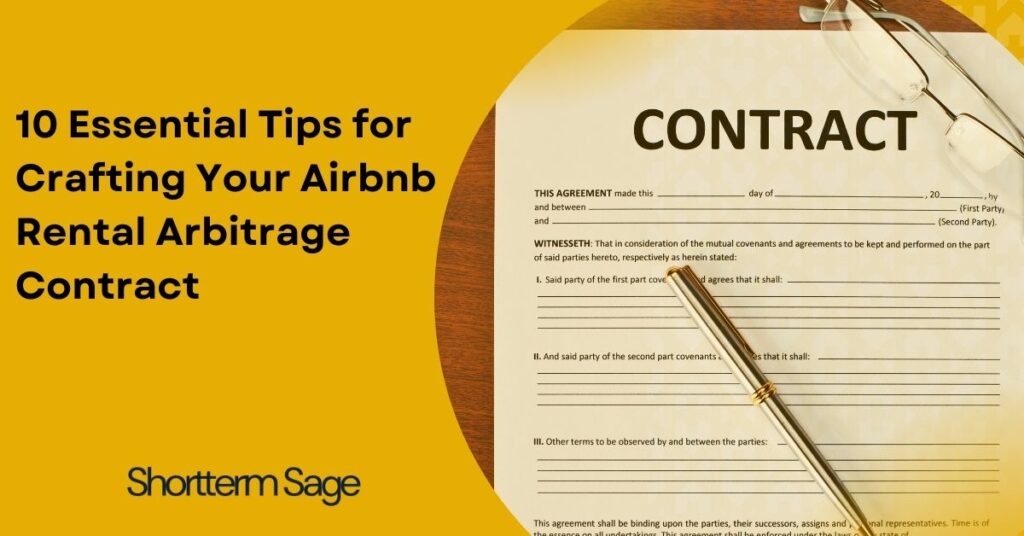
Creating a solid rental agreement is crucial for anyone venturing into the Airbnb rental arbitrage business. This blog post will guide you through ten essential tips to help you craft a contract that protects your interests, especially in uncertain times like a pandemic or recession. Let’s dive in!
Rental arbitrage involves renting a property long-term and then subletting it on platforms like Airbnb for short-term stays. It’s essential to understand that while this can be a lucrative business model, it comes with risks. Your contract should address these risks and outline your rights and responsibilities clearly.
Incorporating a termination clause in your rental agreement can save you from financial distress during unforeseen events. For instance, if the market crashes or occupancy rates drop significantly due to economic factors, having a clause that allows you to terminate your lease with minimal penalties can be beneficial. This gives you an exit strategy if circumstances change drastically.
Clearly outline payment terms in your contract to avoid misunderstandings. Include details such as the rent amount, due dates, and penalties for late payments. It’s also wise to specify how and when payments will be made, so both you and your landlord have a clear understanding of the financial obligations.
Just like larger companies such as Sonder and Lyric, consider including protections against black swan events in your lease. This could mean stipulating that if certain economic indicators fall below a threshold, you can defer rent or negotiate lower payments temporarily. While you may not have the leverage of a large corporation, this kind of protection can still be negotiated with smaller landlords.
Always ensure that any verbal agreements are documented in writing. If a landlord agrees to terms via email or verbal communication, request that these terms be added to the contract. This protects you in case the management changes or if there are disputes later on.
Thoroughly review any existing contracts before signing. Understand the terms fully, especially clauses that may restrict your ability to sublet or use the property as a short-term rental. This is crucial because a future management change could alter your rights based on the existing lease agreements.
Consider drafting amendments to your lease that allow for flexibility. For instance, if you need to rent it out for a minimum of 60 days or have specific restrictions on guest occupancy, these should be clearly defined. Having an amendment process in place can help you adapt your business model as needed.
Engage in open discussions with your landlord about your intentions to sublet the property. Explain how rental arbitrage works and how it can be beneficial for both parties. Building a good relationship can lead to more favorable terms in your contract.
Consider seeking professional help when drafting your contracts. Utilizing templates or resources from experienced hosts can provide valuable insights. For example, programs like the VRM Formula offer templates and contracts tailored for rental arbitrage, which can save you time and ensure you cover all necessary aspects.
Engage with communities of fellow hosts, such as Facebook groups like Host Nation, where you can ask questions and share experiences. Connecting with others in the rental arbitrage space can provide support and insights that enhance your understanding of effective contracting practices.
In conclusion, crafting a solid rental agreement is vital for anyone starting in Airbnb rental arbitrage. By incorporating these ten tips, you can create a contract that protects your interests, provides flexibility, and prepares you for any challenges that may arise. Remember, thorough preparation can lead to a successful rental arbitrage business!
Our reviews are made by a team of experts before being written and come from real-world experience. Read our editorial process here.
Some of the links in this article may be affiliate links, which can provide compensation to us at no cost to you if you decide to purchase a paid plan. These are products we’ve personally used and stand behind. This site is not intended to provide financial advice. You can read our affiliate disclosure in our privacy policy.
About the author:
This website is operated and maintained by Short Term Sage LLC. Use of the website is governed by its Terms Of Service and Privacy Policy.
Short Term Sage LLC may link to content or refer to content and/or services created by or provided by third parties that are not affiliated with Short Term Sage LLC. Short Term Sage LLC is not responsible for such content and does not endorse or approve it.
We use cookies to help improve, promote and protect our services. By continuing to use this site, you agree to our privacy policy and terms of use.